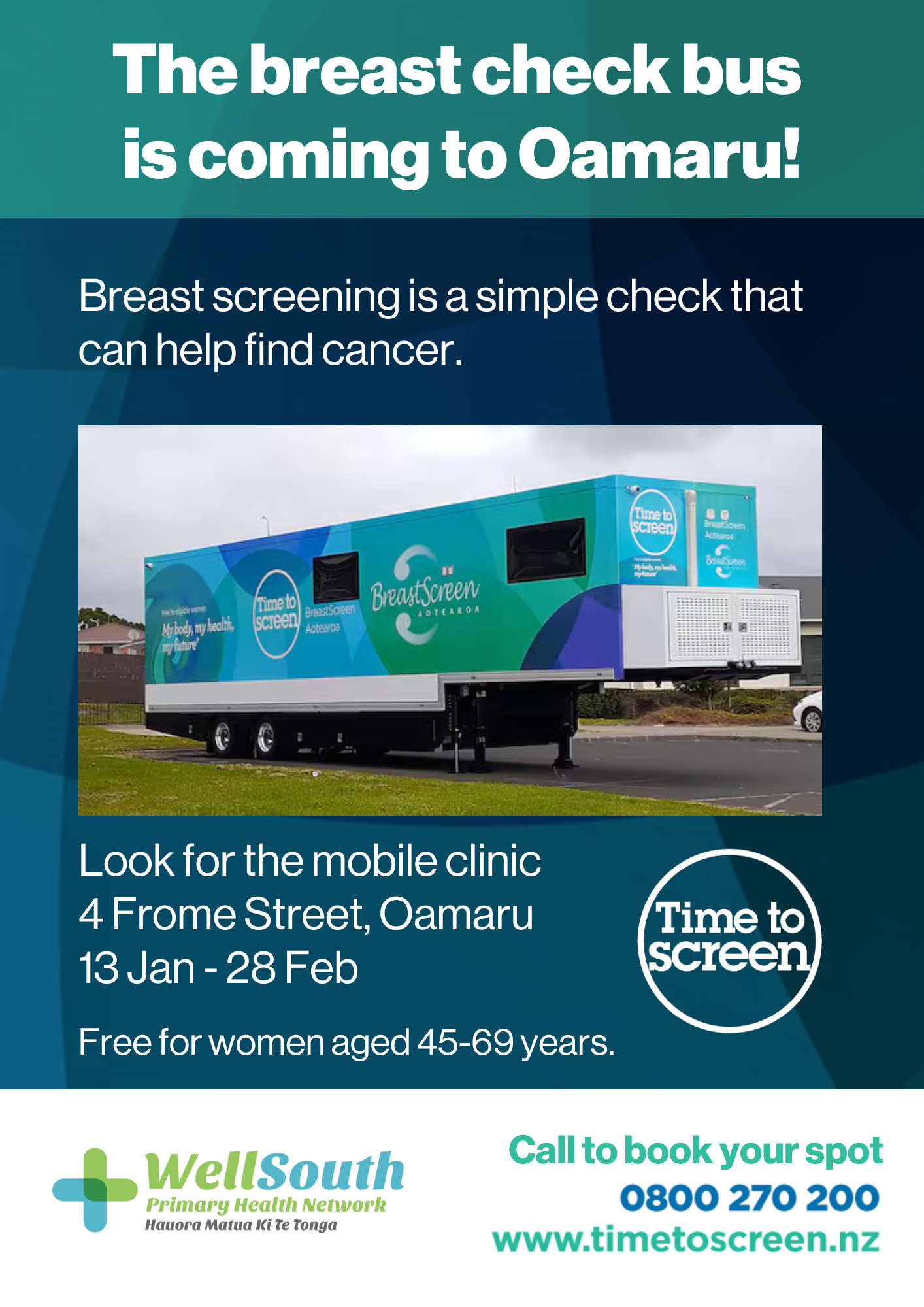Breast Screening in Oamaru

Next: Thursday, 6 February 2025
Runs until Friday, 28 February 2025 (See all dates)
- Time
- 10:00 - 16:00
- Venue
- Carpark, 4 Frome Street, Oamaru, 9400
- Price
- FREE
As the breast screening bus starts its Southern tour in Oamaru, WellSouth, the Primary Health Organisation for Otago and Southland, is tasked with getting more wāhine to the bus and improve breast check rates for women in Southern.
More Information (Real104 is not responsible for external websites)
Since October 2024, and for the first time, WellSouth now has the contract from Christchurch-based ScreenSouth Limited, that administers BreastScreen Aotearoa Services through BreastScreen South and BreastScreen Otago Southland, the national breast screening programmes for Te Waipounamu. The agreement with WellSouth also specifies improving breast screening access and outcomes for Māori and Pacific Island women within the Southern region to address the equity gap in screening coverage.
Each year approximately 3,000 women are diagnosed with breast cancer in Aotearoa, with Māori and Pacific Island women experiencing the highest rates of cancer. As part of this agreement, around 570 women in Otago and Southland have been identified as needing support to access BreastScreen Aotearoa (BSA) mammograms. Not only Māori and Pasifika, but also rural women who find it much harder to urban access mammogram clinics.
Breastscreen Aotearoa’s mobile clinic will be travelling across Otago and Southland from January onwards to bring health checks to the community. These are mobile clinic dates:
Oamaru 13th Jan - 28th Feb
Ranfurly 3rd March – 11th March
Clyde 12th March - 13th June
Balclutha 16th June - 25th July
Gore 22nd Sept - 12th Nov
Lumsden 13th Nov - 19th Nov
Te Anau 20th Nov - 5th Dec
In Otago and Southland, wāhine Māori and Pacific women are screened around 10% lower than non-Māori and non-Pacific, who are screened at around 69%. In Otago and Southland, around 360 eligible wāhine Māori are ‘enrolled in a PHO’ (therefore in a general practice) but not enrolled in BSA and around 50 Māori women are not enrolled in either a PHO or BSA. For Pacific people, the numbers are smaller; around 110 are not enrolled in BSA but enrolled in a PHO and approximately 60 are not enrolled in either.
Riiti Conway, WellSouth Equity Team Leader Pou Whirinaki says bringing the clinic to communities will help many wāhine prioritise this important check.
“Ten percent may not sound like a big percentage, but these numbers represent real people – mums, sisters, daughters, aunts. If they have a screening mammogram they are more likely to pick up cancer early. A very quick and free health check every two years can lead to better health outcomes,” she says.
Screening mammography alone won’t prevent breast cancer, but evidence shows that regular screening does help with early detection. Women are offered a free mammography every two years through the BSA programme.
Ms Conway says, “Our Pou Manaaki Community Hub Coordinators will be supporting more Māori and Pacific wāhine to enrol and participate in the screening programme, by giving women a call to talk with them about screening, offer to book their appointments and assist with getting to them. This personal support and having the mobile clinic visiting towns will make it less daunting and less time-consuming to get the check.
“We will also work with partners to promote and encourage culturally appropriate services, or improved resources to reduce barriers to access or communication,” says Ms Conway.
“For us, it’s about making it easier to go and get a mammogram, while also upholding the cultural integrity of participants,” she says.
Facts from BreastScreen Otago Southland
- Wāhine Māori and Pacific Island women have a significantly higher breast cancer incidence and mortality compared to non-Māori and are almost twice as likely to die from breast cancer as non-Māori.
- The aim of breast screening is to find very small cancers before a lump can be felt in the breast. Early treatment has the best chance of success.
- Breast cancer is the most common cancer in New Zealand women.
- While screening mammography cannot prevent breast cancer, international evidence shows that mammography, when delivered through an organised screening programme, can reduce mortality from breast cancer.
- The risk of breast cancer increases as you get older. Three-quarters of women who get it are over 50.
To be eligible
- Be aged 45 to 69 years of age (noting that the age range is likely to change to include participants up to 74 years of age in late 2025)
- Have not had mammography within the previous 12 months
- Not be pregnant or breastfeeding
- Be free from breast cancer. If previously diagnosed with breast cancer, be at least five years post-diagnosis
- Be asymptomatic
- Be eligible for public health services in Aotearoa New Zealand.
Venue
Carpark, 4 Frome Street
4 Frome Street
Oamaru
9400
Dates
The event runs from 10:00 to 16:00 on the following dates.
Select a date to add this event to your calendar app.
- January 13th
- January 14th
- January 15th
- January 16th
- January 17th
- January 20th
- January 21st
- January 22nd
- January 23rd
- January 24th
- January 27th
- January 28th
- January 29th
- January 30th
- January 31st
- February 3rd
- February 4th
- February 5th
- February 6th
- February 7th
- February 10th
- February 11th
- February 12th
- February 13th
- February 14th
- February 17th
- February 18th
- February 19th
- February 20th
- February 21st
- February 24th
- February 25th
- February 26th
- February 27th
- February 28th


